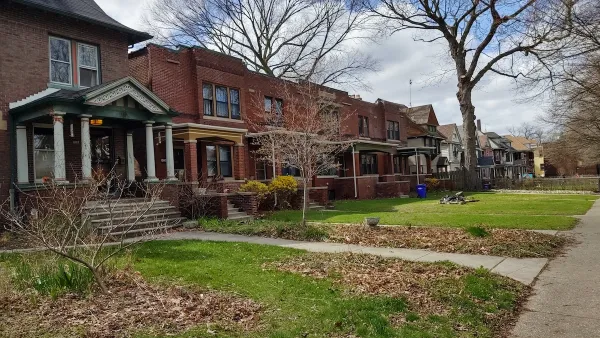In Minneapolis, and cities across the country, surface parking lots are an enduring blight on urban landscapes; their presence often incentivized by existing tax structures. Could a new approach to property taxation maximize the productivity of land?

Chris Keimig looks at the ways in which the conventional property tax system is sabotaging Minneapolis's development goals by disincentivizing more productive use of the city's overabundance of surface parking lots; a blight that covers one-third of the entire surface area of downtown. "The conventional property tax, which taxes land and buildings at the same rate, is essentially backwards when it comes to the behaviors it incentivizes," argues Keimig. "It penalizes property owners for building or making improvements to their structures, while rewarding speculators and absentee landlords who would rather allow their properties to decay than make expensive (and annually taxable) improvements."
To solve this dilemma, Keimig advocates a two-rate system that would tax land at a higher rate than buildings. "By taxing land at or near its development potential," he says, "owners of land being used at less than maximum productivity would be paying a disproportionate amount in taxes in order to keep it that way."
"Aside from the obvious goal of raising money to pay for public services, we levy taxes either to discourage a particular behavior in favor of another (taxes on cigarettes and alcohol discourage consumption and thus promote healthier lifestyles/lower health care costs), or because a given resource is scarce while demand for it is high (i.e., the gasoline tax). But if the city is trying to encourage development—and to attract the 70,000 more downtown residents it seeks by 2025—it hardly makes sense to place a tax on that behavior. Similarly, if the city wants potential developers to treat land as the scarce resource that it is—encouraging them to build up rather than out in order to maximize economic output and reduce sprawl—it makes sense to tax land at a higher rate than buildings."
FULL STORY: Tax Land, Not Buildings

Maui's Vacation Rental Debate Turns Ugly
Verbal attacks, misinformation campaigns and fistfights plague a high-stakes debate to convert thousands of vacation rentals into long-term housing.

Planetizen Federal Action Tracker
A weekly monitor of how Trump’s orders and actions are impacting planners and planning in America.

Chicago’s Ghost Rails
Just beneath the surface of the modern city lie the remnants of its expansive early 20th-century streetcar system.

Bend, Oregon Zoning Reforms Prioritize Small-Scale Housing
The city altered its zoning code to allow multi-family housing and eliminated parking mandates citywide.

Amtrak Cutting Jobs, Funding to High-Speed Rail
The agency plans to cut 10 percent of its workforce and has confirmed it will not fund new high-speed rail projects.

LA Denies Basic Services to Unhoused Residents
The city has repeatedly failed to respond to requests for trash pickup at encampment sites, and eliminated a program that provided mobile showers and toilets.
Urban Design for Planners 1: Software Tools
This six-course series explores essential urban design concepts using open source software and equips planners with the tools they need to participate fully in the urban design process.
Planning for Universal Design
Learn the tools for implementing Universal Design in planning regulations.
planning NEXT
Appalachian Highlands Housing Partners
Mpact (founded as Rail~Volution)
City of Camden Redevelopment Agency
City of Astoria
City of Portland
City of Laramie




























